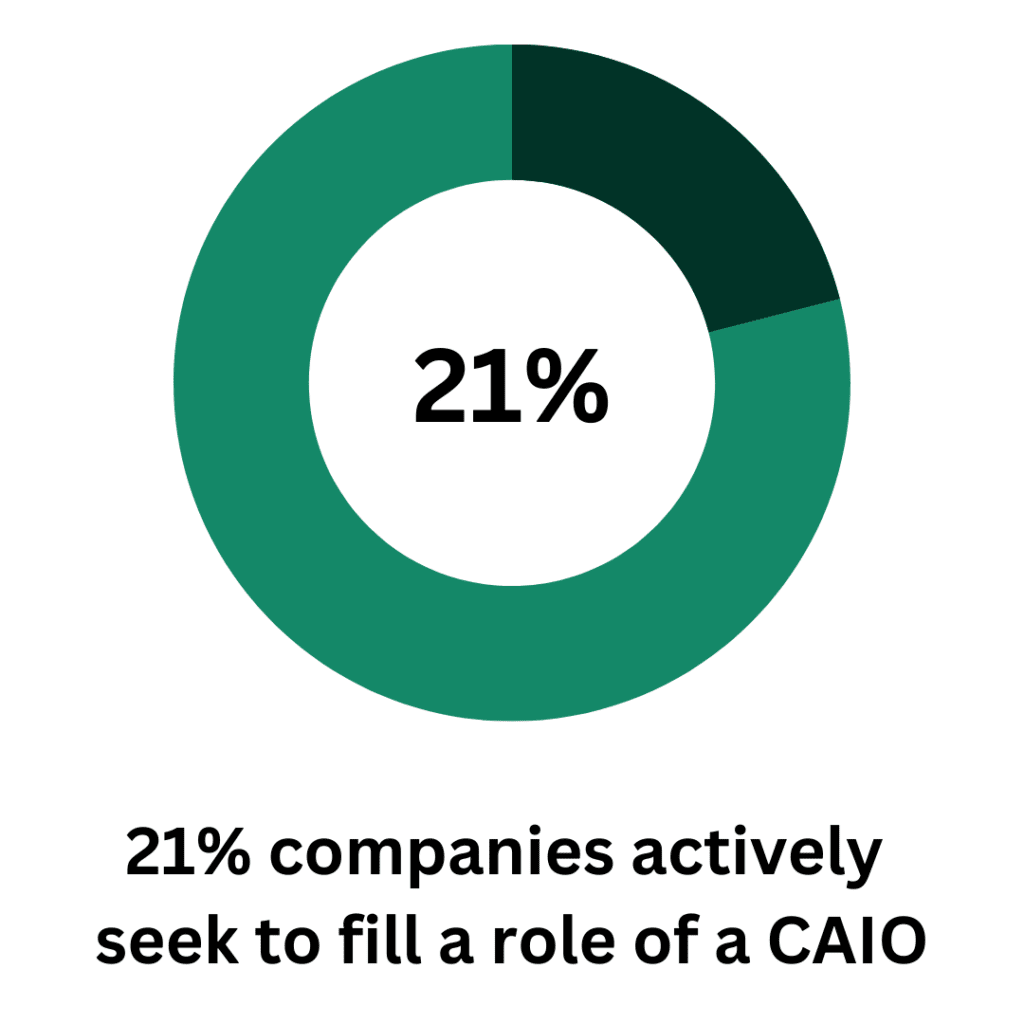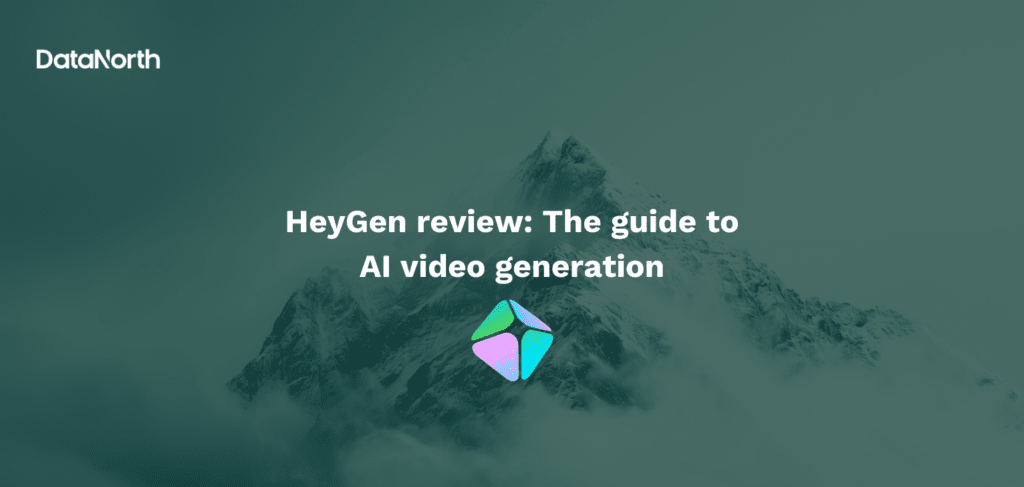In today’s world of AI, the demand for experts is strongly tied to the fast-growing technological innovations. According to Foundry’s 2023 study, 11% of midsize to large companies have established a role of a Chief Artificial Intelligence Officer (CAIO), highlighting the growing demand for AI leadership.
Furthermore, the growing demand for AI expertise and AI technical skills is evident, as 21% of these companies are actively seeking to fill in this crucial position. This trend highlights the increasing importance of AI leadership in driving innovation and success.

What is a Chief AI Officer?
Chief AI Officer (CAIO) is a senior executive responsible for guiding an organization’s artificial intelligence strategy and implementation. This role requires a strong understanding of AI technologies and data analytics, deep knowledge of machine learning algorithms and neural networks, and excellent communication and leadership abilities, along with an awareness of ethical and regulatory considerations.
What are the Responsibilities of a CAIO
1. Strategic Leadership
The CAIO is responsible for defining the organization’s AI vision and roadmap, ensuring that the AI strategy aligns with overall business goals. This involves identifying potential AI opportunities that can enhance operational efficiency and drive innovation, ultimately contributing to the organization’s competitive advantage.
2. Ethical Aspects of AI
A key responsibility of the CAIO is to ensure that the AI strategy complies with relevant laws and regulations. This includes developing policies for responsible AI usage that address critical issues such as transparency, bias, and data privacy, thereby fostering trust and accountability in all AI initiatives.
3. Technical Oversight
The CAIO leads the integration of AI technologies across the organization, supervising their deployment within teams to maximize its effectiveness. This role involves close collaboration with IT and other departments to ensure that AI solutions are effectively implemented and aligned with organizational needs.
4. Culture of Innovation
The CAIO helps build a strong AI innovation culture by encouraging experimentation, promoting AI understanding, and supporting continuous improvement across teams. This includes setting up ways for teams to share AI knowledge, enabling employees to bring forward ideas and use AI tools in their work, and creating an environment where innovation becomes a natural part of the organization.
Why Establishing a CAIO in Your Organization Might Be Beneficial
Establishing a Chief AI Officer (CAIO) role is beneficial due to the unique challenges that come with integrating AI and machine learning in organizations.
You may ask, “Why do I need a CAIO if I already have a CTO?”. While the Chief Technology Officer (CTO) is responsible for overseeing all aspects of technology and infrastructure, the CAIO’s role is focused specifically on AI applications, governance, and ethics—areas that demand specialized expertise beyond traditional technology leadership roles.
This approach ensures that machine learning and AI initiatives are aligned with business objectives, and the CAIO provides dedicated oversight for these projects to maximize their impact.
In many cases, the CAIO and CTO work collaboratively to develop comprehensive technical solutions. The CAIO often reports to the CTO, ensuring alignment with the overall technology strategy while providing expertise in AI. This cooperation enhances organizational effectiveness, allowing for a strong, unified vision and strategy in AI implementation, effective risk management, and adherence to ethical AI practices.
Cons of a CAIO Position
- Risk of a Slower Integration of AI
There is a danger that AI initiatives may become isolated from the rest of the business operations. Effective AI integration should involve the entire organization, as collaboration across teams is essential for success.
- Overemphasis on AI Solutions
Having a CAIO could lead to an excessive focus on AI technologies, potentially overshadowing simpler and more cost-effective alternatives that may better suit the organization’s needs.
- Significant Costs
Establishing a new C-suite position entails considerable costs, including salary, benefits, and resources needed to support the role. This investment may not always bring proportional returns, especially for smaller organizations.
When Does Your Company Need a CAIO?
- Leadership of AI
If your organization is adopting, or wants to adopt more AI technologies, the increasing complexity of these projects may cause the need for dedicated leadership. This clear leadership not only aids in making strategic decisions but also streamlines processes and enhances accountability in executing AI projects. If your team is struggling to manage the complexities of AI implementation, it may be time to consider appointing a CAIO.
- Unified AI Projects
In organizations where multiple departments are developing AI solutions independently, a CAIO can help integrate these efforts under a single, cohesive strategy for an AI-driven innovation. Central management of AI projects promotes collaboration between teams, reduces duplication of work, and encourages the sharing of best practices. If your company finds that various departments are working in silos on AI initiatives, a CAIO can unify these projects, improving effectiveness and maximizing the return on investment by aligning resources toward common objectives.
- Management of AI Risks
The deployment of AI technologies brings various risks, including data privacy issues, algorithmic bias, and challenges in regulatory compliance. A CAIO is essential for managing these risks through the creation of policies and frameworks that address potential issues. If your organization is concerned about navigating the ethical and legal landscape of AI, appointing a CAIO can ensure that all AI projects adhere to ethical guidelines and legal requirements, promoting responsible use of AI across the company.
- AI-Competitive Industry
If your company operates in an industry where AI is becoming increasingly vital for success, having a dedicated CAIO is crucial. Organizations in these environments need to stay ahead of technological advancements and market trends. A CAIO not only drives innovation but also monitors emerging AI developments and evaluates their potential impact on the business. If your organization aims to enhance its competitive edge in a fast-paced market, establishing strong AI leadership through a CAIO can demonstrate your commitment to transformation and position your company for success.
The Future of CAIO
As we can see, AI is set to become an inevitable part of business and everyday life, with predictions indicating that by 2026, over 80% of organizations will be using generative AI or deploying AI applications. This acceleration of AI adoption across various industries highlights the growing recognition of the need for specialized AI leadership.
Given these trends, it is beneficial for organizations to consider whether employing a Chief AI Officer (CAIO) is the right choice for their needs. At DataNorth, we offer CAIO as a service, providing the expertise necessary to navigate the complexities of AI implementation and drive successful outcomes. If you feel that a full-time CAIO may not be necessary for your organization, it can still be highly beneficial to invest in understanding and overseeing AI developments. Building knowledge and staying informed about AI can help you make the most of its potential. DataNorth offers guidance and expertise in AI to support you in these efforts and help you reach your AI goals.





